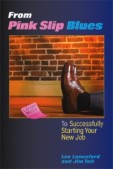Blog Archives
5 Weakest Excuses For Failing To Job Search.
 Are you the person who scrambles for new work when your current job goes belly up? Or maybe you’re sick of your boss, workload, or lack of advancement opportunity? You might whip up a resume, slap some content onto Facebook and LinkedIn, write a panic-driven networking note to long-ignored colleagues and friends, and impatiently check off the onerous tasks you’ve been ignoring.
Are you the person who scrambles for new work when your current job goes belly up? Or maybe you’re sick of your boss, workload, or lack of advancement opportunity? You might whip up a resume, slap some content onto Facebook and LinkedIn, write a panic-driven networking note to long-ignored colleagues and friends, and impatiently check off the onerous tasks you’ve been ignoring.
When it comes to focusing on your job search, there are millions of feeble reasons for not conducting it successfully.
Here are five terrible excuses job seekers give for not being prepared for their next big move, as well as ways to combat them:
Excuse No. 1: I don’t have time. In a job search, carving out just 45 minutes each day to draft and execute a plan can make all the difference.
Do you somehow find time to watch your favorite morning TV program while enjoying a cup of coffee and Danish? Then try turning that program off for a few months. Focus on plotting a course, writing a proper resume, crafting a unique LinkedIn profile, researching companies, and getting your networking efforts in order.
Before you know it, after a few weeks or months of this daily and focused effort, your job search will gain the musclenecessary to lift your career to a new level.
Excuse No. 2: I can’t do this on my own. You don’t have to! Whether tapping into a myriad of complimentary Web resources, or investing in modestly priced careers books, an abundance of job-search resources exist at your fingertips. Careers blogs and articles with advice on how to build your resume, best prepare for an interview, and network can all be found at your local library or bookstore. And don’t forget about the many resume and career coaches that are available for hire. You never need to feel alone in your job search.
Excuse No. 3: Job searching is boring. Doing the same old thing over and over will get boring and net the same old stagnant results (or lack thereof). Stop aimlessly wandering the Internet, posting resumes to job boards, and Tweeting and Facebook-ing your job-search woes.
Instead, un-suction yourself from your computer keyboard and start flexing your muscles—literally.
Find offline activities that get your juices flowing. Join a local LinkedIn group and attend their next get-together. Join the area chapter of an industry association and volunteer to help.Meeting new people in your areas of professional interest will not only spark your creative and intellectual juices, but it will also increase the odds of meeting that one contact who can link you to your next job opportunity.
The added value: You’ll enjoy receiving a warm smile, firm handshake, and maybe even a hug or two as you excitedly discuss new goals and initiatives that take you out of your daily routine. Keep experimenting with new motions to move you outside the humdrum of your day and get your juices flowing.
Excuse No. 4: I don’t believe in second chances. You’ve failed so many times in your career that you can’t envision it being any different this time, so you just stay where you are, sucking it up and grinding it out at a job you hate. Everyone deserves a second chance and sometimes even a third and fourth. Don’t let your past get in the way of your future.
Clear your chi and start with a clean slate. If this means surrounding yourself only with healthy encouraging people who see your positive attributes and want the best for you, then spend time exclusively with them; at least for the short-term while you regain some self-confidence.
Rejuvenate your self-belief and then plow ahead with zeal and vigor. You deserve to control your destiny in a job you love.
Excuse No. 5: I lack self-control. We all lack self-control when we fail to meet our own expectations. Be in charge of yourself, time, and energy. Only you can establish boundaries as to where you invest your conversations, intellectual efforts, and physical activities. Only you can accept or decline that next job offer, filtering your decision through your wants and needs. Using a no-excuses approach in your job search will ensure that time spent in your career transition will be focused, meaningful, and positive. By retraining the way you think, your job-search momentum will increase. And more favorable results will follow.
Jacqui Barrett-Poindexter is a Glassdoor career and workplace expert, chief career writer and partner with CareerTrend, and is one of only 28 Master Resume Writers (MRW) globally. Jacqui and her husband, “Sailor Rob,” host a lively careers-focused blog at http://careertrend.net/blog.Jacqui is a power Twitter user (@ValueIntoWords), listed on several “Best People to Follow” lists for job seekers.
Finding A Job After 50: Know How To Sell Yourself.
 Job-seekers spend the majority of their time and focus on three aspects of their search: their resume, networking and preparing for interviews. It goes without saying that each of these elements is critical to job search success, however the most elemental piece of the process is often overlooked. In order to present yourself as an attractive, viable candidate, you’ll need to know what employers want — and that takes research.
Job-seekers spend the majority of their time and focus on three aspects of their search: their resume, networking and preparing for interviews. It goes without saying that each of these elements is critical to job search success, however the most elemental piece of the process is often overlooked. In order to present yourself as an attractive, viable candidate, you’ll need to know what employers want — and that takes research.
Any savvy marketer realizes that prior to launching a product, he or she has to determine the needs and preferences of their customers. In fact, it is only through a thorough understanding of their customers’ needs that marketers can then go on to identify their product’s key selling points: what makes it unique, how it’s better than the competition, etc.
You’ll want to follow this same information-gathering process as you prepare for and conduct your job search. Consider that the only difference between you and a marketing department is that your customers are your potential employers.
Here are three ways you can ensure you’re gathering the information you’ll need:
1) Use job postings as a research tool
Although job-seekers turn to online postings, they often do so for the wrong reason. It’s estimated that fewer than 15 percent of positions are obtained by responding to postings. So this means you should only spend about 15 percent of your time in that activity (way less than most job-seekers).
Postings, however, can prove extremely helpful as research tools. They tell you who’s hiring, the skills that are currently in demand, the latest buzzwords for your industry, etc. As you peruse the listings, you’ll want to:
- Look for keywords/skills you see come up again and again. If they’re true for you, make certain they’re prominently displayed on your resume and that you can speak to them when networking or during a job interview.
- Identify the types of training/technical skills required and ensure that you have them. If you need to update your skill sets, there are a number of low-fee or free software training sites online, including GCF Learn Free and Microsoft Office Training.
2) Look at the trends
Identify the recent developments in your field: locally, nationally and internationally. (Today’s economy is a global one and you’ll need to be able to speak with confidence from all three perspectives.) Also ask yourself the following:
- Is your field expanding or contracting? (There are jobs to be found within contracting industries, but you’ll want to be aware of that fact so you can make an educated choice as to whether or not you wish to remain in the field.)
- Considering recent developments, what are your personal opportunities for advancement within the industry?
3) Research your occupation
Although you may have been in your line of work for years, you’ll need to present yourself as a consummate professional who’s on top of your game. You may also be considering a career change and, if so, you’ll want to determine:
- Which organizations might employ someone like you?
- How can you best present yourself to these companies?
- What additional education or training might you need?
- What is the current labor demand and future outlook for the occupation?
The Occupational Outlook Handbook is a resource providing current, helpful information regarding specific occupations. You’ll find detailed information as to the “nature of the work,” “training and qualifications,” “job outlook,” “related occupations,” and more.
Research is your key to identifying the needs of potential employers, making certain you’re well prepared and properly trained for the job, and ensuring you will present yourself as the candidate they’re seeking. So do your due diligence. You’ll be well rewarded for your efforts and you just might land your next job in record time. Source/Credit: Mary Eileen Williams is a Nationally Board Certified Career Counselor with a Master’s Degree in Career Development and twenty years’ experience assisting midlife jobseekers to achieve satisfying careers. Her book, Land the Job You Love: 10 Surefire Strategies for Jobseekers Over 50, is a step-by-step guide that helps you turn your age into an advantage. It’s packed with information providing mature applicants with the tools to successfully navigate the modern job market and gain the edge over the competition. Visit her website at Feisty Side of Fifty.com and celebrate your sassy side!
Jump-Start A Stalled Job Search.
 Are you in the hunt for a new job? If so, you probably know how hard it is to stay focused and energetic. Today, I have some ways you can fine-tune your job search and jump-start one that seems stalled.
Are you in the hunt for a new job? If so, you probably know how hard it is to stay focused and energetic. Today, I have some ways you can fine-tune your job search and jump-start one that seems stalled.
There are two phases to every job search. The first phase is developing job-search skills, or the how-to part of a search, and the second involves the mental energy and focus needed to keep your search moving.
If you’re not getting results from the resumes you’re sending and applications you’re completing, take some time to review your job-search plan. Here are some ideas to get you started:
- Review your goals. If you’re off track, refocus on the direction you want to go.
- Pay attention to your self-talk. What are your thoughts when you are disappointed? It’s easy to start doubting yourself and believing in rejection. If that happens, you’re more likely to give up or slow down your job-search activities.
- Keep meeting new people, and maintain contact with your circle of friends. Make sure you are asking good questions when you make contact with someone new. You may need a different set of questions to produce results.
- Don’t procrastinate. Follow up with every lead and opportunity that interests you.
- Join a group or get a job-search buddy system going. If you’re accountable to someone, it will be easier to maintain your routine.
Source/Credit: Kim Thompson for sfgate.com.










